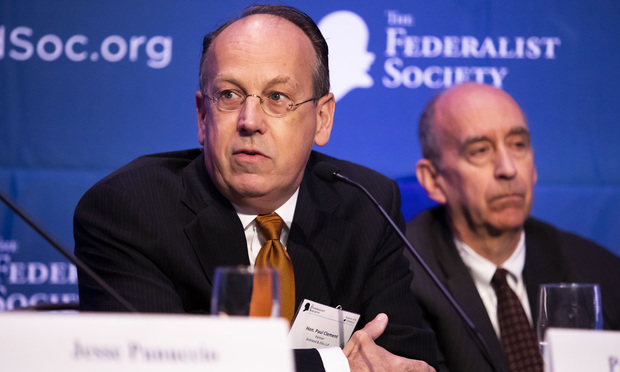Exasperated Roberts Confronts Lingering Birth Control Coverage Questions
"Well, the problem is neither side in this debate wants the accommodation to work," Chief Justice John Roberts Jr. said at one point during Wednesday's arguments. "Is it really the case that there's no way to resolve those differences?"
May 06, 2020 at 02:05 PM
5 minute read
 Paul Clement, speaking at the Federalist Society's 7th Annual Executive Branch Review Conference on May 8, 2019. (Photo: Diego M. Radzinschi / ALM)
Paul Clement, speaking at the Federalist Society's 7th Annual Executive Branch Review Conference on May 8, 2019. (Photo: Diego M. Radzinschi / ALM)
During arguments Wednesday on challenges to free contraceptive health insurance under the Affordable Care Act, Chief Justice John Roberts Jr. expressed exasperation that the government and religious organizations have not resolved their differences over providing the coverage after nearly a decade, and he raised concerns about whether the Trump administration's effort to exempt employers might "sweep too broadly."
"I didn't understand the problem at the time of Zubik [v. Burwell], and I'm not sure I understand it now," said Roberts, who may hold the decisive vote in the combined cases Little Sisters of the Poor v. Pennsylvania and Trump v. Pennsylvania.
The chief justice, speaking to Kirkland & Ellis partner Paul Clement, representing Little Sisters, was referring to the 2016 Supreme Court case Zubik v. Burwell. Religious nonprofits, objecting to the birth control insurance coverage, challenged a government accommodation that allowed them to opt out of the coverage requirement if they notified their insurers or third party plan administrators of their objections.
In the Zubik case, the religious nonprofits claimed the notification form, subsequently used to find or provide independent coverage, made them complicit in providing the coverage. The justices did not resolve the issue; instead, they sent the cases back to the lower courts to find some compromise.
"Well, the problem is neither side in this debate wants the accommodation to work," Roberts said at one point during Wednesday's arguments. "Is it really the case that there's no way to resolve those differences?"
At the core of the latest fight are rules granting categorical exemptions from the coverage for for-profit and nonprofit employers that have religious as well as moral objections to the coverage. Pennsylvania and New Jersey challenged the exemptions, arguing that the exemptions are not authorized—as claimed by the Trump administration—by the Affordable Care Act and the Religious Freedom Restoration Act.
The states also claimed the Trump administration violated the federal Administrative Procedure Act when it issued the first interim rules without first providing notice and an opportunity for public comment. The U.S. Court of Appeals for the Third Circuit ruled in favor of the states and upheld a nationwide injunction against their enforcement.
Justice Stephen Breyer echoed Roberts' frustration with the continuing fight over birth control insurance.
"The point of the religion clauses is to try to work out accommodations," he told Clement. "I don't understand why this can't be worked out."
Breyer suggested the states brought the wrong type of challenge to the coverage exemptions. The "proper legal box," he indicated, would be a challenge to the exemptions as arbitrary and capricious because insurers, women, religious groups and taxpayers all claim some kind of injury.
 Supreme Court Justice Ruth Bader Ginsburg speaks at Columbia Law School. (Photo: David Handschuh/ALM)
Supreme Court Justice Ruth Bader Ginsburg speaks at Columbia Law School. (Photo: David Handschuh/ALM)As Roberts, Breyer and other justices struggled with the issues in the cases, Justice Ruth Bader Ginsburg, recovering from a gall bladder condition in Johns Hopkins Hospital, made clear her view.
"At the end of the day, the government is throwing to the winds women's entitlement to seamless, no cost to them, contraceptive coverage," Ginsburg told Clement. "This idea that the balance has to be all for Little Sister-type organizations and not at all for women seems to rub against our history of accommodation, tolerance and respect for divergent views."
U.S. Solicitor General Noel Francisco, defending the Trump administration, told Ginsburg that he disagreed with her view. "There is nothing in the ACA" that requires contraceptive coverage, he argued. The Obama administration's signature health care law delegates to the enforcing agencies the decision whether to provide it, he said.
Pennsylvania Chief Deputy Attorney General Michael Fischer argued that "the moral and religious exemptions rest on sweeping claims of authority." He said they would allow any employer to opt out entirely from providing the coverage, including for "vaguely defined moral beliefs."
The prior rules, Fisher said, struck a balance. "This case is not the result of a long-running dispute but an extension of authority inconsistent with Congress and the courts," he argued.
The Trump administration also asked the justices to examine the nationwide injunction entered by the district court against the new exemptions. Justice Clarence Thomas, who has questioned the legitimacy of those injunctions, asked the only questions about national injunctions during Wednesday's arguments.
Clement, in response to Thomas, said that type of injunction was "inappropriate" in cases—like the one before the court—where there have been years of litigation in which courts have not come to uniform decisions in the lower courts. In such cases, he said, nationwide injunctions are "not consistent with equity practice or the way the judicial system works."
The justices' arguments on Wednesday were the third day this week of telephonic arguments in the coronavirus era. Although the court had scheduled 60 minutes for the arguments, they ran over time by 40 minutes.
Read more:
'Briefly, Counsel': How Chief Justice Roberts Keeps Phone Arguments Moving
A Few Pauses, and 'Sorry, Chief,' But Supreme Court Pulls Off Historic First
After Roberts Rebuke, Schumer Expresses Regret for 'Pay the Price' Warning
Chief Justice Roberts Rebuffs Trump After He Criticizes Judges Again
This content has been archived. It is available through our partners, LexisNexis® and Bloomberg Law.
To view this content, please continue to their sites.
Not a Lexis Subscriber?
Subscribe Now
Not a Bloomberg Law Subscriber?
Subscribe Now
NOT FOR REPRINT
© 2025 ALM Global, LLC, All Rights Reserved. Request academic re-use from www.copyright.com. All other uses, submit a request to [email protected]. For more information visit Asset & Logo Licensing.
You Might Like
View All
Bill Would Allow Californians to Sue Big Oil for Climate-Linked Wildfires, Floods
3 minute read
Insurance Policies Don’t Cover Home Depot's Data Breach Costs, 6th Circuit Says

State High Court Bucks Trend Favoring Insurers, Sides With Restaurants Seeking COVID-19 Coverage
Law Firms Mentioned
Trending Stories
- 1Uber Files RICO Suit Against Plaintiff-Side Firms Alleging Fraudulent Injury Claims
- 2The Law Firm Disrupted: Scrutinizing the Elephant More Than the Mouse
- 3Inherent Diminished Value Damages Unavailable to 3rd-Party Claimants, Court Says
- 4Pa. Defense Firm Sued by Client Over Ex-Eagles Player's $43.5M Med Mal Win
- 5Losses Mount at Morris Manning, but Departing Ex-Chair Stays Bullish About His Old Firm's Future
Who Got The Work
J. Brugh Lower of Gibbons has entered an appearance for industrial equipment supplier Devco Corporation in a pending trademark infringement lawsuit. The suit, accusing the defendant of selling knock-off Graco products, was filed Dec. 18 in New Jersey District Court by Rivkin Radler on behalf of Graco Inc. and Graco Minnesota. The case, assigned to U.S. District Judge Zahid N. Quraishi, is 3:24-cv-11294, Graco Inc. et al v. Devco Corporation.
Who Got The Work
Rebecca Maller-Stein and Kent A. Yalowitz of Arnold & Porter Kaye Scholer have entered their appearances for Hanaco Venture Capital and its executives, Lior Prosor and David Frankel, in a pending securities lawsuit. The action, filed on Dec. 24 in New York Southern District Court by Zell, Aron & Co. on behalf of Goldeneye Advisors, accuses the defendants of negligently and fraudulently managing the plaintiff's $1 million investment. The case, assigned to U.S. District Judge Vernon S. Broderick, is 1:24-cv-09918, Goldeneye Advisors, LLC v. Hanaco Venture Capital, Ltd. et al.
Who Got The Work
Attorneys from A&O Shearman has stepped in as defense counsel for Toronto-Dominion Bank and other defendants in a pending securities class action. The suit, filed Dec. 11 in New York Southern District Court by Bleichmar Fonti & Auld, accuses the defendants of concealing the bank's 'pervasive' deficiencies in regards to its compliance with the Bank Secrecy Act and the quality of its anti-money laundering controls. The case, assigned to U.S. District Judge Arun Subramanian, is 1:24-cv-09445, Gonzalez v. The Toronto-Dominion Bank et al.
Who Got The Work
Crown Castle International, a Pennsylvania company providing shared communications infrastructure, has turned to Luke D. Wolf of Gordon Rees Scully Mansukhani to fend off a pending breach-of-contract lawsuit. The court action, filed Nov. 25 in Michigan Eastern District Court by Hooper Hathaway PC on behalf of The Town Residences LLC, accuses Crown Castle of failing to transfer approximately $30,000 in utility payments from T-Mobile in breach of a roof-top lease and assignment agreement. The case, assigned to U.S. District Judge Susan K. Declercq, is 2:24-cv-13131, The Town Residences LLC v. T-Mobile US, Inc. et al.
Who Got The Work
Wilfred P. Coronato and Daniel M. Schwartz of McCarter & English have stepped in as defense counsel to Electrolux Home Products Inc. in a pending product liability lawsuit. The court action, filed Nov. 26 in New York Eastern District Court by Poulos Lopiccolo PC and Nagel Rice LLP on behalf of David Stern, alleges that the defendant's refrigerators’ drawers and shelving repeatedly break and fall apart within months after purchase. The case, assigned to U.S. District Judge Joan M. Azrack, is 2:24-cv-08204, Stern v. Electrolux Home Products, Inc.
Featured Firms
Law Offices of Gary Martin Hays & Associates, P.C.
(470) 294-1674
Law Offices of Mark E. Salomone
(857) 444-6468
Smith & Hassler
(713) 739-1250









